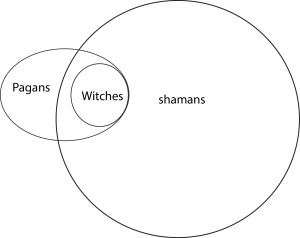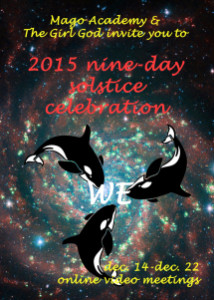
Their priests (whom they call Quiokosoughs) are no other but such as our English witches are.
— Reverend Alexander Whitaker, Good newes from Virginia (sermon), 1613.
A question arose after my post on Witches and Wiccans regarding the difference between a shaman and a Witch. The answer is both simple and complex. The simple (and correct) answer is that there is no difference, except that one category is larger than the other. To give an analogy, what’s the difference between a Lutheran and a Christian? They are not different, are they? Not all Christians are Lutherans, but all Lutherans are Christians. The complexity with Witchcraft arises from the illogical but determined efforts of anthropologists to turn “witch” and “shaman” into discrete categories.
Let’s turn to the dictionary definition of “shaman” first. This is from Random House:
(esp. among certain tribal peoples) a person who acts as an intermediary between the natural and supernatural worlds, using magic to cure illness, foretell the future, control spiritual forces, etc.
Witches act as intermediaries “between the natural and supernatural worlds” by performing complex rituals or more simple spells that are usually geared toward healing, divination, or controlling the outcome of events (such as bringing rain or finding a job). Witches are not, however, the “certain tribal peoples” that the word typically refers to. The origin of “shaman” is contested, but most believe it to be of Siberian origin. It has an identical meaning in the Evenki language. It might properly be used only to refer to a similar group of magical practices from Siberia, but it is more generally applied. Attempts have been made to limit the application by specifying that it must refer to a tribal group, indigenous practices, the use of trance states, origin in non-urban societies, long-standing evolution in nature-based societies, and practices which have continuity. Witches contend that their religion meets all of these requirements while many academic scholars contend that it does not. Honest scholarship favors the Witches’ point of view, but some might ask whether the quest for a shamanic definition that excludes Witches is itself rooted in dishonesty about the tenaciousness of Europe’s magical legacy, as well as visceral prejudice against Witches fostered by Christianity.
My definition of a “shaman,” a bit tongue-in-cheek, is someone who doesn’t use that word. All “shamanic” traditions have their own word for their priests and priestesses, and outside of Central Asia that word is never “shaman.” In English, the word is “witch,” with all its baggage.
Nonetheless there is an unmistakable need for a generic word for “a person who acts as an intermediary between the natural and supernatural worlds, using magic, etc.,” because we need a word for comparing practices in a cross-cultural sense. That word has become “shaman.”
Marketing has also created or exacerbated a perception of a dichotomy between Witchcraft and other forms of shamanism. Books and courses that are not related to Witchcraft are frequently described as “shamanic” to their intended audience, with “shamanic” meaning everything but Witchcraft. Quizzing the purveyors of this material, they acknowledge that Witchcraft is a form of shamanism, but they feel that including Witchcraft under their shamanic banner hampers their marketing efforts. Doubtless this relates to the fierce prejudice against witchcraft which still resides with the general public. On the other side of the equation, Witches themselves sometimes object to the word “shaman,” feeling like a word popularized outside of their religions should not be applied to them.
So all Witches are shamans, but not all shamans are Witches. Are all Pagans shamans? No. Paganism and Witchcraft are polytheistic religions with a European or Mediterranean origin, but not all Pagans cast spells or perform magic with the intention of influencing events. So all Witches are Pagans, all Witches are shamans, some Pagans who are not Witches are shamans, but not all Pagans are shamans. Got that?



